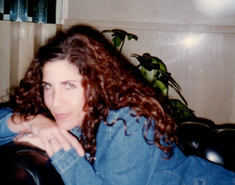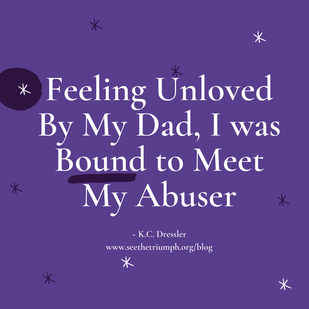|
by K.C. Dressler, See the Triumph Guest Blogger What if life had a remote control, I could hit rewind, and go back to when I was eight-years-old? What would adult Kim tell Kimmy, my inner child, to help her understand? Even though daddy didn’t give you regular kisses or big hugs. Even though daddy didn’t attend your dance recitals. Even though daddy buried his face in a newspaper or televised sport, shooing you away like a dog when you wanted his attention. Even though daddy said, “I love you” without showing you love. Understand, he loved you. He loved you in his own way. The first time I experienced intimate partner violence is etched in my mind: His olive complexion was fiery red. His dark eyes narrowed, bore a hole through me. The veins in his neck, blueish green, were bulging on each side, his full lips pursed. In an instant, his large hand slapped me across the face so hard, my 115-pound body fell to a dirty, cold, hard slab of cement. I stopped breathing—the air sucked out of me like a deflated balloon. Everything went black. Like the time my mom told me I blacked out as a kid at a roller-skating rink, from crying without taking a breath because I wasn't getting my way. Since I was a little girl, I longed to feel loved by my dad. I wanted warm, tight hugs and kisses. I wanted to feel my dad loved me, not just hear the words “I love you” spoken so often, like saying, “Have a nice day.” I wanted the approval of the first man I loved, kissed with lips full of drool, and hugged with unconditional love. Because my childhood was devoid of my dad demonstrating actions intrinsic to my development, I didn’t possess self-worth, which rendered me likely to attract a man who was verbally (emotionally) and physically abusive. To be fair, my dad wasn’t cognizant he was emotionally unavailable. He couldn’t have known, feeling unloved by him was as if he had taken my hand and led me to four years of tug-of-war with Kimmy, listening to the whispers in my ear, he shows you love, he loves you, it’s okay. As a survivor, years later I had profound thoughts, swirling around my head, wondering, questioning, “When does abuse begin? What if abuse toward women, by an intimate partner, doesn’t begin when they are, punched, slapped, beaten, called a “bitch,” told they are “nothing” told they are “dumpy,” raped, or forced to perform sexual acts for the first time?” What if the precursor to the evolution of abuse is when they are children, yearning to feel loved by their dad, needing more than the words “I love you” spoken? It is true, we are all born with self-worth; for self-worth to develop, it was crucial my dad was physically and emotionally present in my life. And "physically" doesn’t mean he needed to live in the same dwelling, because divorce happens, but to be a consistent part of my life. Although my dad was involved, he wasn’t engaged and he was emotionally absent. While the emotional component for many dads isn’t so easy, they can still offer their daughters time and attention, showing them they are worthy of a man's time and caring. A dad can attempt to show he cares, by drawing upon the love he has for his daughter. Being there for her is what reverberates in her subconscious. It was vital for me to accept my dad and his emotional limitations. It happened when I was 40—something, sitting in front of my laptop, writing an essay about father-daughter relationships, when tears began streaming, well, kind of gushing down my face, while a simultaneous laugh rolled off my tongue. I had been released from emotional captivity, an overwhelming sense of liberation, relinquishing the pain and hurt I experienced for decades, but took mere minutes to dispel. My epiphany (breakthrough) wasn’t limited to accepting my dad, I also accepted myself—for merely existing. So, then I asked myself again. What if life had a remote control, I could hit rewind, and go back to when I was eight-years-old? What would adult Kim tell Kimmy, to help her understand? If my eight-year-old self had understood she was loved by her dad, maybe she wouldn’t have felt unloved and not cried after every weekend visit. But I still would have been bound to meet my abuser.  K.C. Dressler has a Master’s degree in School Counseling. While writing her book Whispers in Her Ear, she conducted research to prove her theory: a strong correlation between women who have experienced verbal/emotional and/or physical abuse from an intimate partner and unresolved father-daughter issues. Whispers in Her Ear is based on an essay K.C. wrote, The Soft, Blue Blanket, published in Entropy magazine. As a survivor of domestic violence and stalking, she knows firsthand how a positive father-daughter relationship is crucial to a little girl maintaining self-worth. Comments are closed.
|
Archives
July 2024
CategoriesAll About Intimate Partner Violence About Intimate Partner Violence Advocacy Ambassadors Children Churches College Campuses Cultural Issues Domestic Violence Awareness Month Financial Recovery How To Help A Friend Human Rights Human-rights Immigrants International Media Overcoming Past Abuse Overcoming-past-abuse Parenting Prevention Resources For Survivors Safe Relationships Following Abuse Schools Selfcare Self-care Sexual Assault Sexuality Social Justice Social-justice Stigma Supporting Survivors Survivor Quotes Survivor-quotes Survivor Stories Teen Dating Violence Trafficking Transformative-approaches |
Search by typing & pressing enter



 RSS Feed
RSS Feed